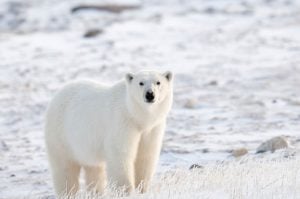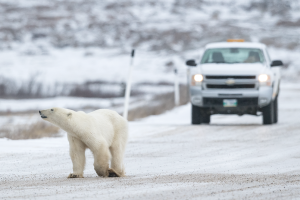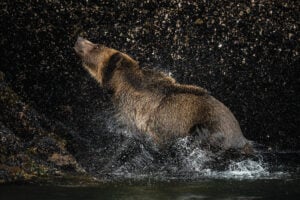It’s just after 10 a.m. in the Toba Inlet, tucked below glacier-capped mountains soaring 2,500 metres above us. The coastal mountains send spectacular waterfalls full of sediment crashing into the striking turquoise ocean below. This is the territory of the Klahoose Nation. Since time immemorial the Klahoose (toq qaymɩx) people believe that the spirits of their ancestors, as well as the animals, water, and all plant life here are interconnected and cannot live independently from one another. What modern science now calls a healthy ecosystem.
It feels like we’re the only people on Earth. In fact, I’m part of a group of 12 on a Canadian Geographic Travel Expedition to the off-grid Klahoose Wilderness Resort. The epicenter of this sustainable eco-resort is a cedar longhouse that serves as a lodge. With six rooms, the resort provides an experience that is intimate and luxurious despite the rough terrain outside its doors. The resort both located on Klahoose land and also owned and operated by the Indigenous nation.
As an environmental journalist and documentary filmmaker, my stories have brought me to many rugged and remote landscapes across British Columbia. But unlike destinations such as the secluded Great Bear Rainforest, which have gained mainstream popularity in the last few years, Klahoose is relatively close to Vancouver while still feeling quite, out there. Only accessible by boat or seaplane, the resort is located in the heart of Desolation Sound — a place locals refer to as B.C.’s Hawaii. A flight to Vancouver, a subsequent tiny plane out of the South Terminal to Powell River, followed by a windy drive to Lund and then a one-hour boat ride makes getting to this relatively untouched wildland an accessible getaway from the city of Vancouver.
We’ve been waiting for hours in the pouring rain, moving every so often to a new outpost, patient and eager to see grizzlies. I need to continuously wipe rain drops off my camera lens. “It’s a good day to be a duck,” says Leon Timothy, our wildlife guide. Despite the wet, it’s stunningly beautiful. Ribbons of fog are trapped, interwoven between the trees that cover the surrounding mountains. At first glance, the landscape is a dizzying blend of a dozen shades of soaking wet greens. But with the help of Leon, we begin to discern a variety of species in the foliage.
But while it’s relatively easy to get here, the Toba Inlet isn’t an outback that easily gives up its secrets.
The wildlife truly blend into their natural environment. You can spend hours looking for signs of life and not see or hear a thing, despite there being fauna going about their lives all around you . You need to be in the know, whispers passed down through generations to the stewards of this land. Our guides are all indigenous to Desolation Sound, and despite our close proximity to large predators like bears and wolves, we feel totally safe within their knowledge of our natural world, wisdom passed down from their ancestors.









